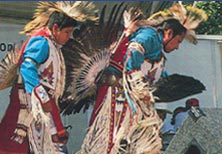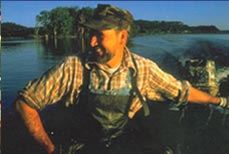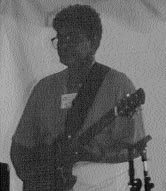






| Resources | ||||||
|
||||||
| Learning Guide |
| 1. Social Studies |
| 2. Language Arts |
| 3. Music |
| 4. Art |
| 5. Special: Multi-Disciplinary, Culminating Activities |
|
The blues are a vocal musical form developed among African Americans in the United States. A blues composition creates a reflective mood as it tells a story. As a genre, the blues is characterized by specific vocal patterns and instrumental accompaniment. One typical vocal pattern consists of three lines of four measures each, with the second line repeating the first, and the third line rhyming with the first two. M1/M2/M3/M4da Line A, ending in da Hey baby/where are you/going with your/fishing pole? The repetition of the first line is like call-and-response, commonly found in gospel and other African-American musical traditions where a singer sings a line which is then answered by members of a group. In blues music, the musician answers himself/herself with the second line of the lyrics. Call-and-response also is evoked when the lead instrument answers the vocalist with a fill—a short guitar or harmonica solo. Additional lines are typically in rhyme, repeating the same vocal pattern several times. Variation and use of clipped word syllables is typical.
Folklife Background The roots of the blues may extend back to the ballads sung by griots (storytellers) in West Africa. The blues developed in the American South from work songs sung by slaves on the cotton plantations. By the early 20th century, the blues were a recognized musical form sung mainly by African Americans expressing the effects of oppressive working and living conditions, difficult personal situations, and the desire to overcome them. The blues influenced the creation of American popular music including country, rhythm and blues, rock-a-billy, and rock ‘n’ roll. Following World War II, folk blues guitarists in the rural South began using the electric guitar, and the style of music known as “urban blues” became popular. Bands playing urban blues usually consisted of electric guitar, bass, piano or electric organ, drums, and sometimes an amplified harmonica. African Americans migrating from the South in search of jobs in the early 20th century brought the blues north to Chicago and other areas in the Midwest. Iowa bluesman Louis McTizic grew up near Memphis, Tennessee. He came from a family of cotton farmers, and his household was a musical one, complete with a piano that on Sundays was hauled from the house to the church and back again. In 1957 he traveled to Waterloo to be near one of his sisters. He fell in love with Waterloo and discovered a community of musicians and singers with whom he played throughout Iowa and Illinois. He now leads his own band, Louis and the Blues Review. The CD contains two selections by Louis and the Blues Review. “Old Fishing Hole” is an early blues song; “Scared of Your Love” was written by Etheleen Wright, who performs with Louis and the Blues Review. Ms. Wright was born in Waterloo, and has performed in blues and jazz clubs across the state as a vocalist and guitarist with her own band. Like other blues bands in the state, Louis and Etheleen perform at clubs for a fee, but also get together to jam at informal house parties, playing for other musicians—as seen in the video selection. |
Previous |
| | Next |
| Objectives | ||||||||
Students will be able to:
|
| Cross References |
Instructional Program: African-American Iowans: 1830s-1970s |
| smithsonian institution |
 |
pioneer hi-bred international, inc. |
iowa sesquicentennial commission |
 |
iowa arts council |
